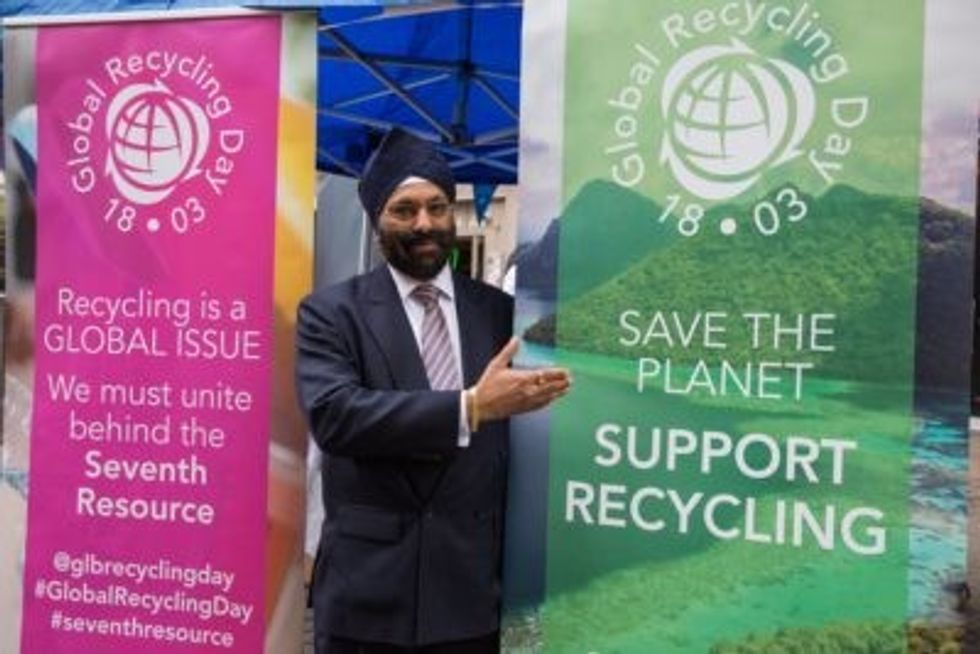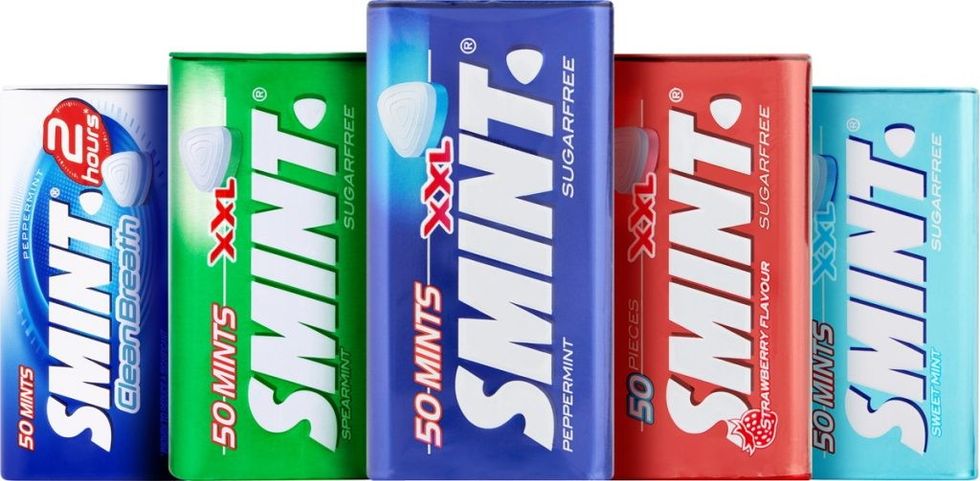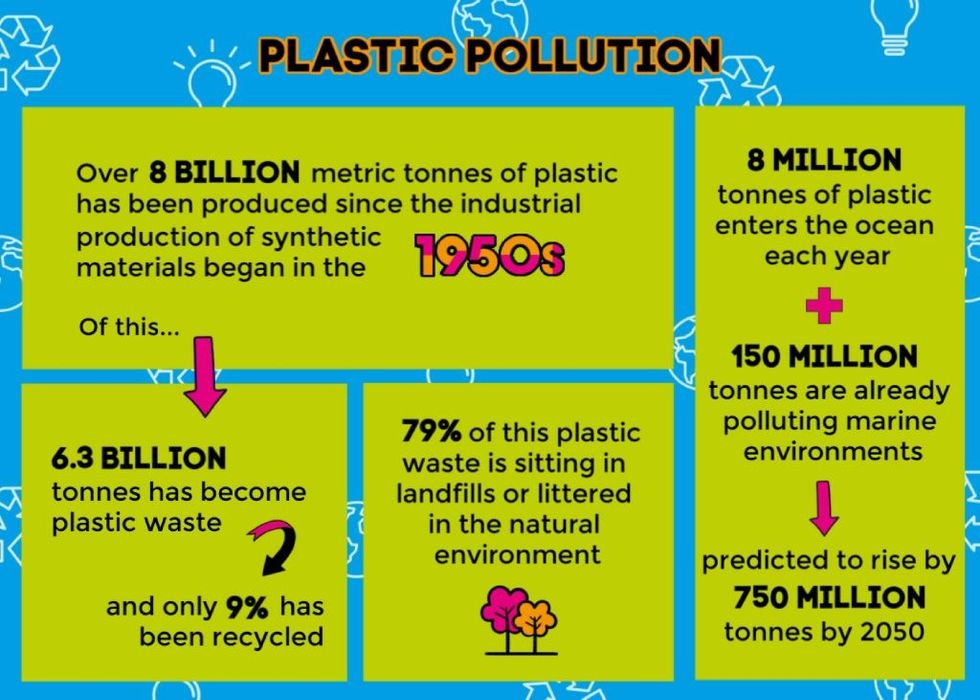Coming together to help the planet for the seventh year running
A message from Perfetti Van Melle
Each year, Global Recycling Day recognises the important role recycling plays in creating an environmentally stable planet, to protect our natural resources and safeguard our future - causes at the core of Perfetti Van Melle’s strategy and philosophy.
The theme of Global Recycling Day 2024 is #RecyclingHeroes, and we can think of no better products to champion this than Mentos Paperboard Bottle and Smint Tins.
Mentos Pure Fresh Gum Paperboard Bottle – made with 90% paper – is a real pioneer within the sustainable packaging landscape, being the first bottle of its kind introduced to the confectionery industry. Having debuted in late 2022 across the full Mentos Pure Fresh Gum range of Cherry, Tropical and Fresh Mint flavours, this exciting piece of innovation has reduced the plastic in Mentos Gum packaging exponentially. Gum fans can continue to say ‘Yes to Fresh’ with the same delicious flavour in a more eco-friendly format.
Smint is the number one sugar-free mint brand in the UK, with 55% growth YoY proof of its enduring popularity. Smint Tins, offering a range of favourite flavours including Peppermint, Spearmint, Sweet Mint and Strawberry, provide instant, long-lasting bursts of freshness in recyclable aluminium packaging. Smint’s fully recyclable tins allow busy consumers to take a moment to refresh whilst on the go, without worries of single-use packaging harming the planet. Smint Tins are endlessly reusable, too!
The ever more eco-conscious customer looks to ensure that their purchasing power is used for environmental benefit, making now the perfect time to stock up on Mentos Pure Fresh Gum Paperboard Bottle and Sint Tins. Mentos and Smint are proud to contribute towards Perfetti Van Melle’s wider sustainability goals with these two fantastic products, forwarding the sustainability agenda of the confectionery industry and helping change public perceptions of packaging from resource to waste.
What is Global Recycling Day?
The Bureau of International Recycling (BIR) established Global Recycling Day in 2018 to help achieve
its goal of greater international recognition of the benefits of recycling. Setting a day each year to
recognise the vital role recycling plays in preserving the wellbeing of our planet, is an effective way
of focusing worldwide attention on the crucial steps urgently needed to safeguard the future of
planet Earth.
Global Recycling Day is the vision of Ranjit Baxi, the President of the Bureau of International
Recycling (BIR), who first announced his desire to launch such a day at his inauguration at BIR’s
convention in Dubai in 2015.
The inaugural Global Recycling Day took place on 18March 2018, on the same day BIR celebrated its
70th anniversary. The Day was an unprecedented success, with more than 13 million people across
the globe actively participating in the day. The results can be seen in the Global Recycling Day
“We are delighted to be working with UNIDO in our efforts to have Global Recycling Day recognized as an official UN day,” said Founding President of the Global Recycling Foundation Ranjit S. Baxi. “We are determined, in collaboration with UNIDO, to build on the momentum we’ve sparked since launching Global Recycling Day in March”.
This Monday, 18 March, will be the seventh Global Recycling Day, which began as an initiative by the Global Recycling Foundation (GRF) and its founder and President, Ranjit Baxi. Before the pandemic and lockdown, its flagship event took place in London, then online – and now it is truly worldwide
For 2024 the GRF is calling on the power of technology in the form of to AI to drive the growth of world trade in recyclables.

The Foundation says AI can develop technologies which will revolutionise the recycling industry – an integral part of the Circular Economy – leading to improved quality standards and deliver a greener future for generations to come.
“AI is a powerful tool which must be harnessed to strengthen the seamless exchange of recyclable raw materials connecting recyclers, manufacturers and suppliers of raw materials worldwide, helping to deliver a carbon-friendly ecosystem.
“We need to build a real time platform streamlining sourcing and trading platforms to optimise efficiency, reduce waste and enhance increase usage of recyclables – the Seventh Resource.
“AI supported automation in our sorting systems will boost the quality of recycling materials by enhancing operational efficiency as sorting and processing of recyclables will be done with more precision and at a higher speed.”
Global Recycling Day and ‘The Seventh Resource’
Not quite as mystical sounding as it seems – in fact very scientific – the Global Recycling Foundation has anchored its philosophy of sustainability and renewal to the concept of an additional, vital natural resource along with water, air, oil, natural gas, coal and minerals. The seventh one is the capability to use them all over again without further depletion of the earth’s resources – so the most important resource of all is … recycling!
The Seventh Resource (read the manifesto) can serve as much as 40% of the world’s raw material needs, and it has been on our doorstep for the whole time, pouring into our rubbish bins, garbage cans, waste mountains and landfill sites every second. As the Foundation points out, The Seventh Resource isn’t finite and can be used again and again, sometimes even indefinitely…
- It helps combat climate change, saving over 700 million tonnes in CO2 emissions every year – and offsets all the CO2 emissions generated by the aviation industry annually.
- It boosts local employment around the world. Approximately 1.6 million people worldwide are employed in processing recyclables.
- The annual contribution of the recycling industry towards global GDP is projected to exceed $400 billion in the next 10 years.
- $20 million dollars is invested each year by the industry into job creation, improving recycling efficiency and environmental impact.
‘Recognising Youth’ – The theme for Recycling Heroes 2024
This year it’s all about the kids! They are the future and they are the ones who will have to care for the world in the future, and use all of their talents and energy to find means to increase recycling and cut back on the pollution we produce in the course of living on the planet – placing the human race more in harmony with it.
For that reason, Recognising Youth is the theme for the Global Recycling Day’s new competition in the search for Recycling Heroes.
Taking its lead from COP28 in Dubai, the Global Recycling Foundations is targeting youthful enterprise in its search for the innovators of tomorrow, helping reduce waste, pollution & carbon emissions whilst promoting recycling and employment.
The Global Recycling Foundation has received many nominations for the award of Recycling Heroes 2024 from young entrepreneurs, individuals to business leaders, sole traders to multinational businesses, and towns and cities that have continued actively to recycle as the world is challenged to meet the climate change goals of 2050. COP 28 pledged to move away from fossil fuels and quickly ramp up renewal energy, and GRF is committed to playing its part in promoting the vital role of recycling as an integral part of the Global Circular Economy in preserving the planet’s resources.
Ten winning entrants will receive $1000 each and their ideas will be publicized on the Global Recycling Day’s social media channels shared across 70 countries connecting over two billion followers.
“COP28 has pointed the way, and we believe young people should be at the forefront of meeting the challenges it has laid down. GRF recognises the huge socio-economic impact on our global economies made by these young business leaders. Young people dare to think the unthinkable and it is their future which matters more than ever.”
We look forward to hearing about the winners!
Big challenges and tasks for 2024
This year, across the world economy, The Global Recycling Foundation is challenging the recycling industry to reap the rewards of Voluntary Carbon Credits (VCC) and Plastic Credits.
GRF says the industry stands to benefit significantly from VCC. It believes that offsetting over a billion tons of carbon savings made by the recycling industry globally will provide billions of dollars of revenue to drive the circular economy, reduce the environmental impact, conserve depleting resources, and increase investments in environmental projects.
“Integrating the symbiotic relationship between VCC and Plastic Credits with the recycling industry will help to build a reliable source of funding to facilitate growth while offering a platform to offset carbon emissions helping to meet Net Zero Goals of 2050 as defined by COP28,” said Ranjit Baxi, founding president of GRF.
“Additionally, it increases employment by creating jobs and strengthens community engagement, helping build sustainable supply chains.
“Integration of VCC into recycling initiatives helps to harness the collective power of the Global Markets enabling the stakeholders drive a meaningful progress towards a greener more resilient future”
Iron and steel
Last week, Ranjit Baxi issued a challenge over the urgent need to decarbonise iron and steel production in the race to Net Zero.
To mark Global Recycling Day on 18 March, GRF has urged policy makers to adopt laws and technologies to make the sector greener and more circular globally. Iron- and steel-making is the world’s largest coal consumer, the largest emitter of CO2 and second largest energy consumer among heavy industries. It accounts for 7-9% of global carbon dioxide emissions, more than the emissions from all road freight.
Global demand for steel has trebled since 1970 and is set increase by more than a third between now and 2050. Much of this demand will come from the wind turbines, solar panels, hydroelectric dams and electric cars, buses, and trains that the world will need to reach net zero.
Baxi said: “This represents a significant challenge. But it also provides a huge opportunity to re-set the world’s iron and steel value chains on a more sustainable path.
“Our call resonates with the ambition of COP28 to accelerate energy transition when it unveiled the Global Decarbonization Accelerator (GDA), a series of landmark initiatives designed to speed up the energy transition and drastically reduce global emissions. As COP28 President HE Dr Sultan Al Jaber said the GDA adds up to more countries and more companies from more sectors than ever before, in the drive towards the goal of 1.5C”. President of the Bureau of International Recycling, BIR, Susie Burrage, added: “To decarbonise iron and steel, we’ll need green hydrogen, carbon capture and storage (CCS) and electric arc furnace (EAF) technologies. We’ll need to use steel less wastefully, to recycle a lot more and to make renewable energy cheaper for steel makers, users and re-users. These things won’t just happen, they will require a combination of innovation and the right, laws, regulation, and incentives.”
Find out more….
Twitter: @GlbRecyclingDay
Facebook: Global Recycling Day
Instagram: globalrecyclingday
And tag your activities using #GlobalRecyclingDay, #RecyclingHeroes and #GRDschools
Watch videos here






